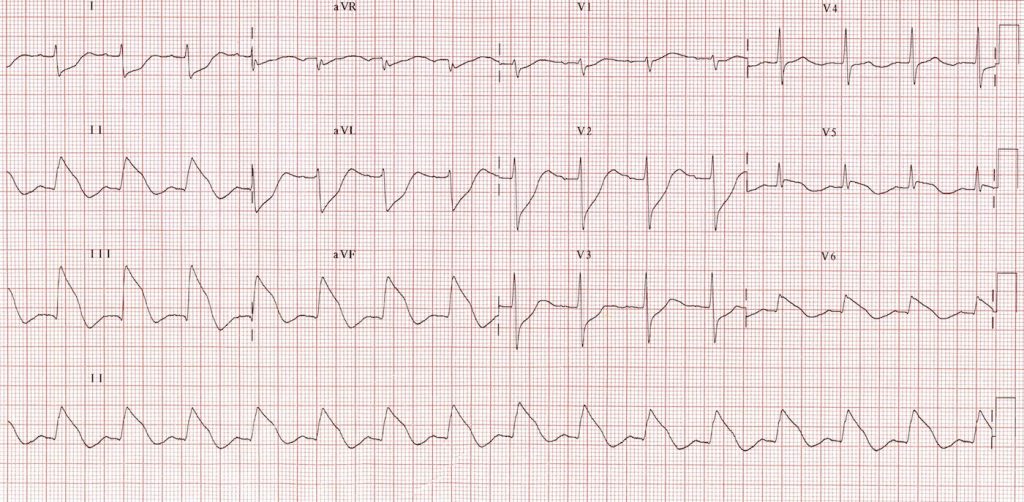A 65-year-old female with a history of hypertension presents to the emergency department with severe tearing chest pain radiating to the upper back. Vital signs are: BP 192/111, HR 105, RR 22, O2 Sat 100% on room air. Cardiac and lung examination are unremarkable, but you note a 1+ left radial artery pulse compared to 2+ right radial artery pulse. ECG is shown. In addition to appropriate consultation, which of the following is the most appropriate immediate next step in management?

B) Esmolol is correct
A) Aspirin: INCORRECT – This patient’s history is concerning for aortic dissection. The ST elevations can occur due to involvement of the aortic root and coronaries. Aspirin should not be given as it can worsen bleeding.
B) Esmolol: CORRECT – This patient is presenting with symptoms concerning for acute aortic dissection. Patients with aortic dissection (specifically type A) can show ST elevations most commonly in the inferior leads due to involvement of the right coronary artery.
In addition to cardiothoracic surgery consult, treatment of aortic dissection usually involves esmolol and nitroprusside; however, labetolol can be used in isolation. The most important treatment principle is to reduce the heart rate and then lower the blood pressure. Rate reduction is important in order to reduce shear stress on the aortic wall. As a beta blocker esmolol is effective in reducing the heart rate as it is easily titratable secondary to a short half-life. Nitroprusside is preferred to nitroglycerin as it is a more potent reducer of blood pressure, and it decreases afterload. Nitroprusside should not be used in isolation as it may increase the rate of rise of aortic wall pressure by increasing shearing forces. Reflex tachycardia may also result secondary to peripheral vasodilation increasing cardiac output.
Source: https://www.ahajournals.org/doi/abs/10.1161/cir.0b013e3181d4739e
C) Heparin: INCORRECT – This patient’s history is concerning for aortic dissection. The ST elevations can occur due to involvement of the aortic root and coronaries. Heparin should not be given as it can worsen bleeding.
D) Nitroglycerin: INCORRECT – This patient’s history is concerning for aortic dissection. Beta-blockers are the recommended initial agent. Once heart rate is controlled, afterload reduction is indicated. While nitroglycerin is an option, nitroprusside is more effective.


